Collaborative Mental Health Nursing Practice in CNC:MH - UTS Report
VerifiedAdded on 2022/11/09
|11
|2524
|443
Report
AI Summary
This report delves into the critical aspects of collaborative mental health nursing, emphasizing the importance of a strong nurse-consumer relationship for quality service delivery. The introduction defines key terms such as collaborative mental health care and highlights the significance of a communitarian approach. The body of the report explores how nurses can gain understanding of patients' lived experiences with mental disorders to foster better interactions and improve health outcomes. It stresses the importance of communication skills, empathy, and providing support, including motivational interviewing techniques and active listening. Furthermore, the report addresses the need to campaign for equity within the nurse-patient dynamic and concludes with a call for mutual respect and understanding to promote effective care. References from peer-reviewed journals support the discussions.
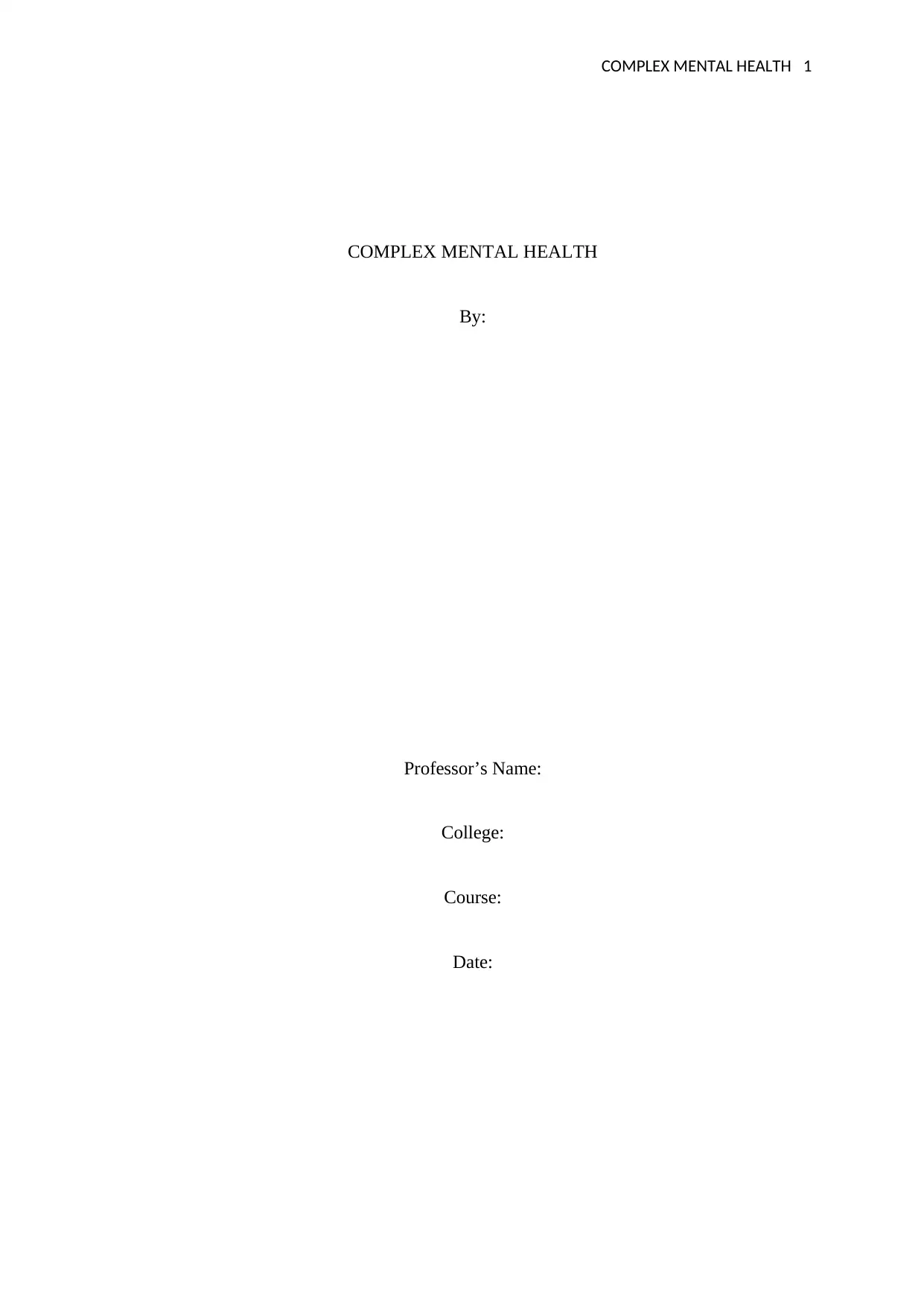
COMPLEX MENTAL HEALTH 1
COMPLEX MENTAL HEALTH
By:
Professor’s Name:
College:
Course:
Date:
COMPLEX MENTAL HEALTH
By:
Professor’s Name:
College:
Course:
Date:
Paraphrase This Document
Need a fresh take? Get an instant paraphrase of this document with our AI Paraphraser
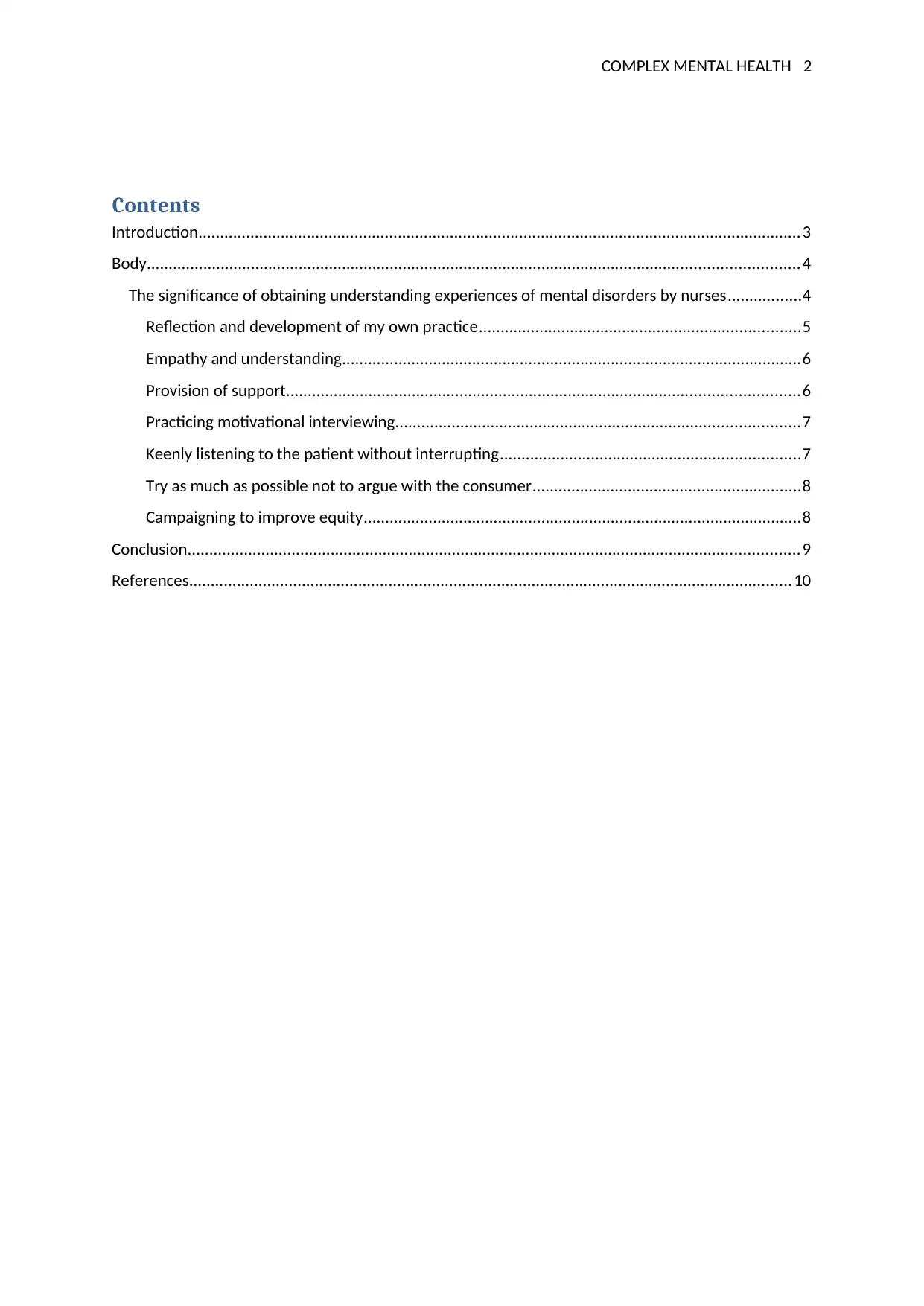
COMPLEX MENTAL HEALTH 2
Contents
Introduction...........................................................................................................................................3
Body......................................................................................................................................................4
The significance of obtaining understanding experiences of mental disorders by nurses.................4
Reflection and development of my own practice..........................................................................5
Empathy and understanding..........................................................................................................6
Provision of support......................................................................................................................6
Practicing motivational interviewing.............................................................................................7
Keenly listening to the patient without interrupting.....................................................................7
Try as much as possible not to argue with the consumer..............................................................8
Campaigning to improve equity.....................................................................................................8
Conclusion.............................................................................................................................................9
References...........................................................................................................................................10
Contents
Introduction...........................................................................................................................................3
Body......................................................................................................................................................4
The significance of obtaining understanding experiences of mental disorders by nurses.................4
Reflection and development of my own practice..........................................................................5
Empathy and understanding..........................................................................................................6
Provision of support......................................................................................................................6
Practicing motivational interviewing.............................................................................................7
Keenly listening to the patient without interrupting.....................................................................7
Try as much as possible not to argue with the consumer..............................................................8
Campaigning to improve equity.....................................................................................................8
Conclusion.............................................................................................................................................9
References...........................................................................................................................................10
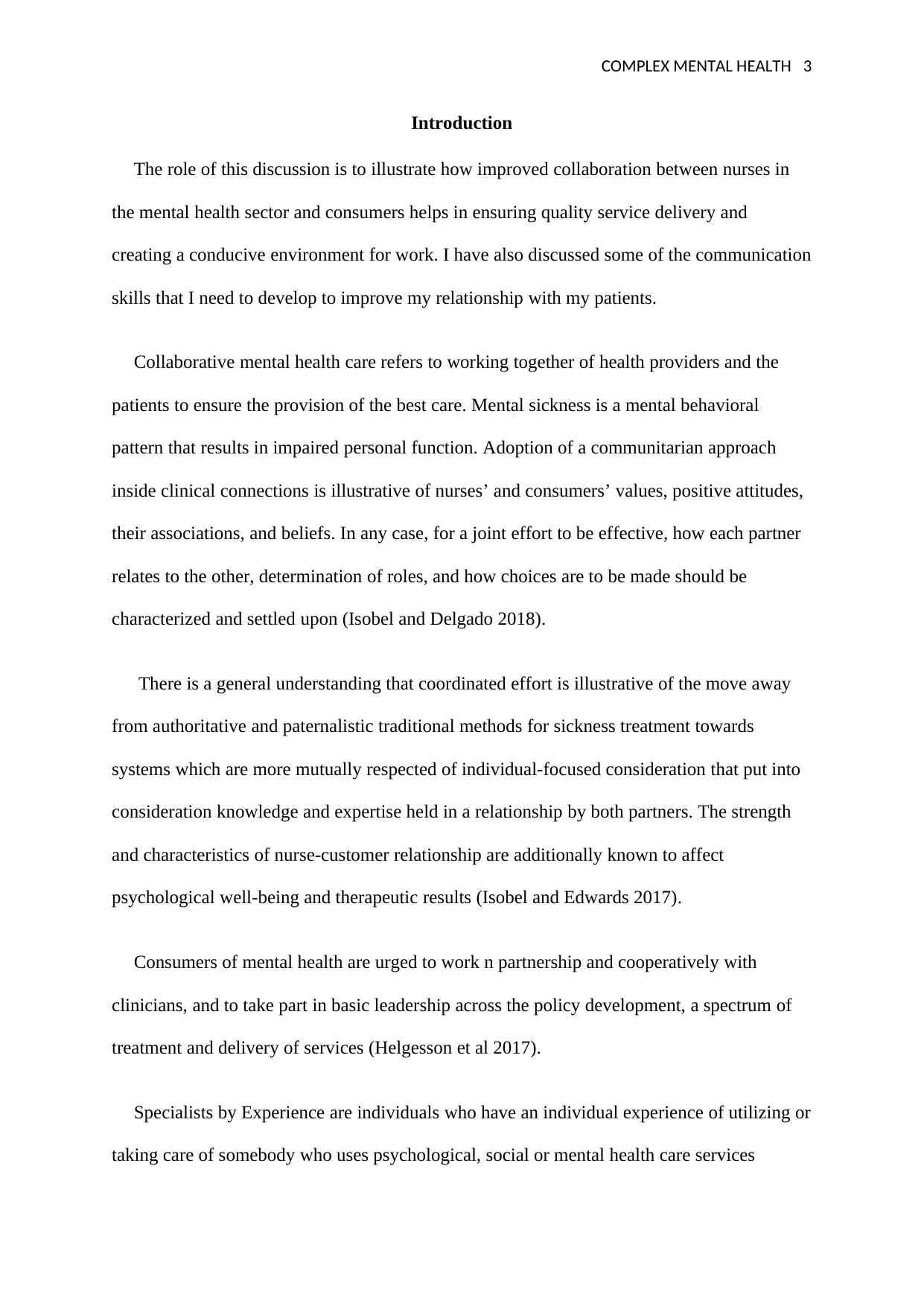
COMPLEX MENTAL HEALTH 3
Introduction
The role of this discussion is to illustrate how improved collaboration between nurses in
the mental health sector and consumers helps in ensuring quality service delivery and
creating a conducive environment for work. I have also discussed some of the communication
skills that I need to develop to improve my relationship with my patients.
Collaborative mental health care refers to working together of health providers and the
patients to ensure the provision of the best care. Mental sickness is a mental behavioral
pattern that results in impaired personal function. Adoption of a communitarian approach
inside clinical connections is illustrative of nurses’ and consumers’ values, positive attitudes,
their associations, and beliefs. In any case, for a joint effort to be effective, how each partner
relates to the other, determination of roles, and how choices are to be made should be
characterized and settled upon (Isobel and Delgado 2018).
There is a general understanding that coordinated effort is illustrative of the move away
from authoritative and paternalistic traditional methods for sickness treatment towards
systems which are more mutually respected of individual-focused consideration that put into
consideration knowledge and expertise held in a relationship by both partners. The strength
and characteristics of nurse-customer relationship are additionally known to affect
psychological well-being and therapeutic results (Isobel and Edwards 2017).
Consumers of mental health are urged to work n partnership and cooperatively with
clinicians, and to take part in basic leadership across the policy development, a spectrum of
treatment and delivery of services (Helgesson et al 2017).
Specialists by Experience are individuals who have an individual experience of utilizing or
taking care of somebody who uses psychological, social or mental health care services
Introduction
The role of this discussion is to illustrate how improved collaboration between nurses in
the mental health sector and consumers helps in ensuring quality service delivery and
creating a conducive environment for work. I have also discussed some of the communication
skills that I need to develop to improve my relationship with my patients.
Collaborative mental health care refers to working together of health providers and the
patients to ensure the provision of the best care. Mental sickness is a mental behavioral
pattern that results in impaired personal function. Adoption of a communitarian approach
inside clinical connections is illustrative of nurses’ and consumers’ values, positive attitudes,
their associations, and beliefs. In any case, for a joint effort to be effective, how each partner
relates to the other, determination of roles, and how choices are to be made should be
characterized and settled upon (Isobel and Delgado 2018).
There is a general understanding that coordinated effort is illustrative of the move away
from authoritative and paternalistic traditional methods for sickness treatment towards
systems which are more mutually respected of individual-focused consideration that put into
consideration knowledge and expertise held in a relationship by both partners. The strength
and characteristics of nurse-customer relationship are additionally known to affect
psychological well-being and therapeutic results (Isobel and Edwards 2017).
Consumers of mental health are urged to work n partnership and cooperatively with
clinicians, and to take part in basic leadership across the policy development, a spectrum of
treatment and delivery of services (Helgesson et al 2017).
Specialists by Experience are individuals who have an individual experience of utilizing or
taking care of somebody who uses psychological, social or mental health care services
⊘ This is a preview!⊘
Do you want full access?
Subscribe today to unlock all pages.

Trusted by 1+ million students worldwide
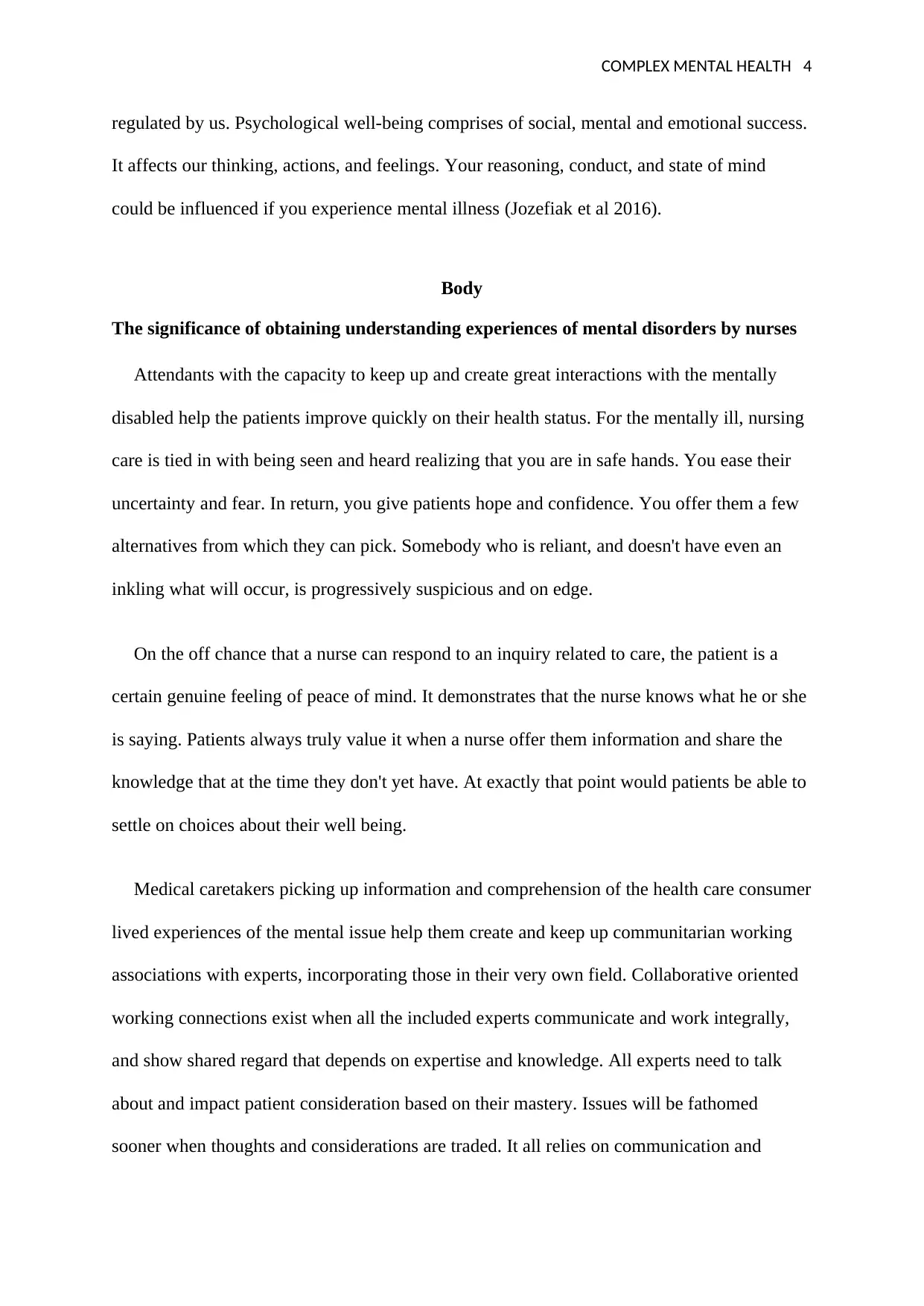
COMPLEX MENTAL HEALTH 4
regulated by us. Psychological well-being comprises of social, mental and emotional success.
It affects our thinking, actions, and feelings. Your reasoning, conduct, and state of mind
could be influenced if you experience mental illness (Jozefiak et al 2016).
Body
The significance of obtaining understanding experiences of mental disorders by nurses
Attendants with the capacity to keep up and create great interactions with the mentally
disabled help the patients improve quickly on their health status. For the mentally ill, nursing
care is tied in with being seen and heard realizing that you are in safe hands. You ease their
uncertainty and fear. In return, you give patients hope and confidence. You offer them a few
alternatives from which they can pick. Somebody who is reliant, and doesn't have even an
inkling what will occur, is progressively suspicious and on edge.
On the off chance that a nurse can respond to an inquiry related to care, the patient is a
certain genuine feeling of peace of mind. It demonstrates that the nurse knows what he or she
is saying. Patients always truly value it when a nurse offer them information and share the
knowledge that at the time they don't yet have. At exactly that point would patients be able to
settle on choices about their well being.
Medical caretakers picking up information and comprehension of the health care consumer
lived experiences of the mental issue help them create and keep up communitarian working
associations with experts, incorporating those in their very own field. Collaborative oriented
working connections exist when all the included experts communicate and work integrally,
and show shared regard that depends on expertise and knowledge. All experts need to talk
about and impact patient consideration based on their mastery. Issues will be fathomed
sooner when thoughts and considerations are traded. It all relies on communication and
regulated by us. Psychological well-being comprises of social, mental and emotional success.
It affects our thinking, actions, and feelings. Your reasoning, conduct, and state of mind
could be influenced if you experience mental illness (Jozefiak et al 2016).
Body
The significance of obtaining understanding experiences of mental disorders by nurses
Attendants with the capacity to keep up and create great interactions with the mentally
disabled help the patients improve quickly on their health status. For the mentally ill, nursing
care is tied in with being seen and heard realizing that you are in safe hands. You ease their
uncertainty and fear. In return, you give patients hope and confidence. You offer them a few
alternatives from which they can pick. Somebody who is reliant, and doesn't have even an
inkling what will occur, is progressively suspicious and on edge.
On the off chance that a nurse can respond to an inquiry related to care, the patient is a
certain genuine feeling of peace of mind. It demonstrates that the nurse knows what he or she
is saying. Patients always truly value it when a nurse offer them information and share the
knowledge that at the time they don't yet have. At exactly that point would patients be able to
settle on choices about their well being.
Medical caretakers picking up information and comprehension of the health care consumer
lived experiences of the mental issue help them create and keep up communitarian working
associations with experts, incorporating those in their very own field. Collaborative oriented
working connections exist when all the included experts communicate and work integrally,
and show shared regard that depends on expertise and knowledge. All experts need to talk
about and impact patient consideration based on their mastery. Issues will be fathomed
sooner when thoughts and considerations are traded. It all relies on communication and
Paraphrase This Document
Need a fresh take? Get an instant paraphrase of this document with our AI Paraphraser
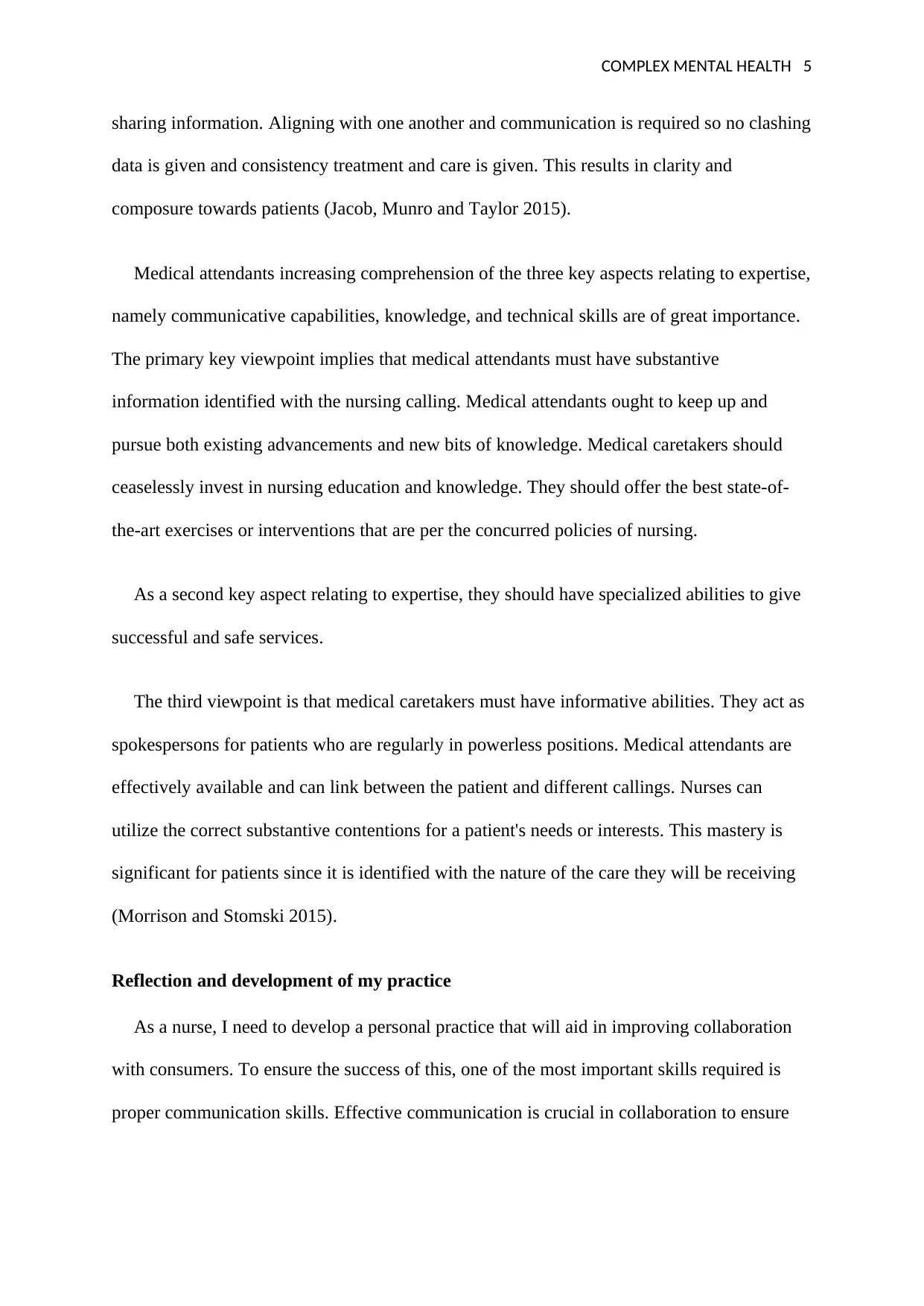
COMPLEX MENTAL HEALTH 5
sharing information. Aligning with one another and communication is required so no clashing
data is given and consistency treatment and care is given. This results in clarity and
composure towards patients (Jacob, Munro and Taylor 2015).
Medical attendants increasing comprehension of the three key aspects relating to expertise,
namely communicative capabilities, knowledge, and technical skills are of great importance.
The primary key viewpoint implies that medical attendants must have substantive
information identified with the nursing calling. Medical attendants ought to keep up and
pursue both existing advancements and new bits of knowledge. Medical caretakers should
ceaselessly invest in nursing education and knowledge. They should offer the best state-of-
the-art exercises or interventions that are per the concurred policies of nursing.
As a second key aspect relating to expertise, they should have specialized abilities to give
successful and safe services.
The third viewpoint is that medical caretakers must have informative abilities. They act as
spokespersons for patients who are regularly in powerless positions. Medical attendants are
effectively available and can link between the patient and different callings. Nurses can
utilize the correct substantive contentions for a patient's needs or interests. This mastery is
significant for patients since it is identified with the nature of the care they will be receiving
(Morrison and Stomski 2015).
Reflection and development of my practice
As a nurse, I need to develop a personal practice that will aid in improving collaboration
with consumers. To ensure the success of this, one of the most important skills required is
proper communication skills. Effective communication is crucial in collaboration to ensure
sharing information. Aligning with one another and communication is required so no clashing
data is given and consistency treatment and care is given. This results in clarity and
composure towards patients (Jacob, Munro and Taylor 2015).
Medical attendants increasing comprehension of the three key aspects relating to expertise,
namely communicative capabilities, knowledge, and technical skills are of great importance.
The primary key viewpoint implies that medical attendants must have substantive
information identified with the nursing calling. Medical attendants ought to keep up and
pursue both existing advancements and new bits of knowledge. Medical caretakers should
ceaselessly invest in nursing education and knowledge. They should offer the best state-of-
the-art exercises or interventions that are per the concurred policies of nursing.
As a second key aspect relating to expertise, they should have specialized abilities to give
successful and safe services.
The third viewpoint is that medical caretakers must have informative abilities. They act as
spokespersons for patients who are regularly in powerless positions. Medical attendants are
effectively available and can link between the patient and different callings. Nurses can
utilize the correct substantive contentions for a patient's needs or interests. This mastery is
significant for patients since it is identified with the nature of the care they will be receiving
(Morrison and Stomski 2015).
Reflection and development of my practice
As a nurse, I need to develop a personal practice that will aid in improving collaboration
with consumers. To ensure the success of this, one of the most important skills required is
proper communication skills. Effective communication is crucial in collaboration to ensure
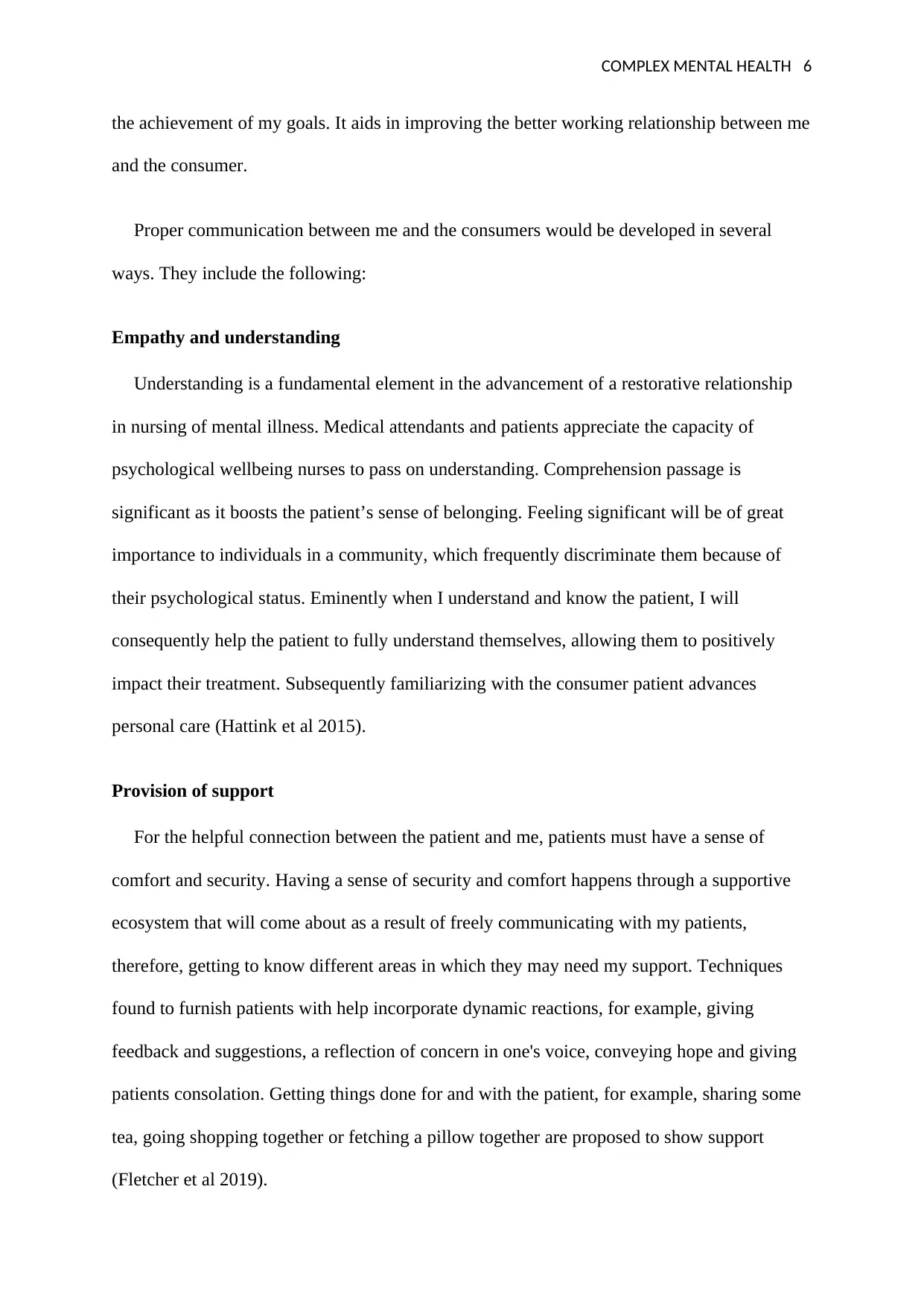
COMPLEX MENTAL HEALTH 6
the achievement of my goals. It aids in improving the better working relationship between me
and the consumer.
Proper communication between me and the consumers would be developed in several
ways. They include the following:
Empathy and understanding
Understanding is a fundamental element in the advancement of a restorative relationship
in nursing of mental illness. Medical attendants and patients appreciate the capacity of
psychological wellbeing nurses to pass on understanding. Comprehension passage is
significant as it boosts the patient’s sense of belonging. Feeling significant will be of great
importance to individuals in a community, which frequently discriminate them because of
their psychological status. Eminently when I understand and know the patient, I will
consequently help the patient to fully understand themselves, allowing them to positively
impact their treatment. Subsequently familiarizing with the consumer patient advances
personal care (Hattink et al 2015).
Provision of support
For the helpful connection between the patient and me, patients must have a sense of
comfort and security. Having a sense of security and comfort happens through a supportive
ecosystem that will come about as a result of freely communicating with my patients,
therefore, getting to know different areas in which they may need my support. Techniques
found to furnish patients with help incorporate dynamic reactions, for example, giving
feedback and suggestions, a reflection of concern in one's voice, conveying hope and giving
patients consolation. Getting things done for and with the patient, for example, sharing some
tea, going shopping together or fetching a pillow together are proposed to show support
(Fletcher et al 2019).
the achievement of my goals. It aids in improving the better working relationship between me
and the consumer.
Proper communication between me and the consumers would be developed in several
ways. They include the following:
Empathy and understanding
Understanding is a fundamental element in the advancement of a restorative relationship
in nursing of mental illness. Medical attendants and patients appreciate the capacity of
psychological wellbeing nurses to pass on understanding. Comprehension passage is
significant as it boosts the patient’s sense of belonging. Feeling significant will be of great
importance to individuals in a community, which frequently discriminate them because of
their psychological status. Eminently when I understand and know the patient, I will
consequently help the patient to fully understand themselves, allowing them to positively
impact their treatment. Subsequently familiarizing with the consumer patient advances
personal care (Hattink et al 2015).
Provision of support
For the helpful connection between the patient and me, patients must have a sense of
comfort and security. Having a sense of security and comfort happens through a supportive
ecosystem that will come about as a result of freely communicating with my patients,
therefore, getting to know different areas in which they may need my support. Techniques
found to furnish patients with help incorporate dynamic reactions, for example, giving
feedback and suggestions, a reflection of concern in one's voice, conveying hope and giving
patients consolation. Getting things done for and with the patient, for example, sharing some
tea, going shopping together or fetching a pillow together are proposed to show support
(Fletcher et al 2019).
⊘ This is a preview!⊘
Do you want full access?
Subscribe today to unlock all pages.

Trusted by 1+ million students worldwide
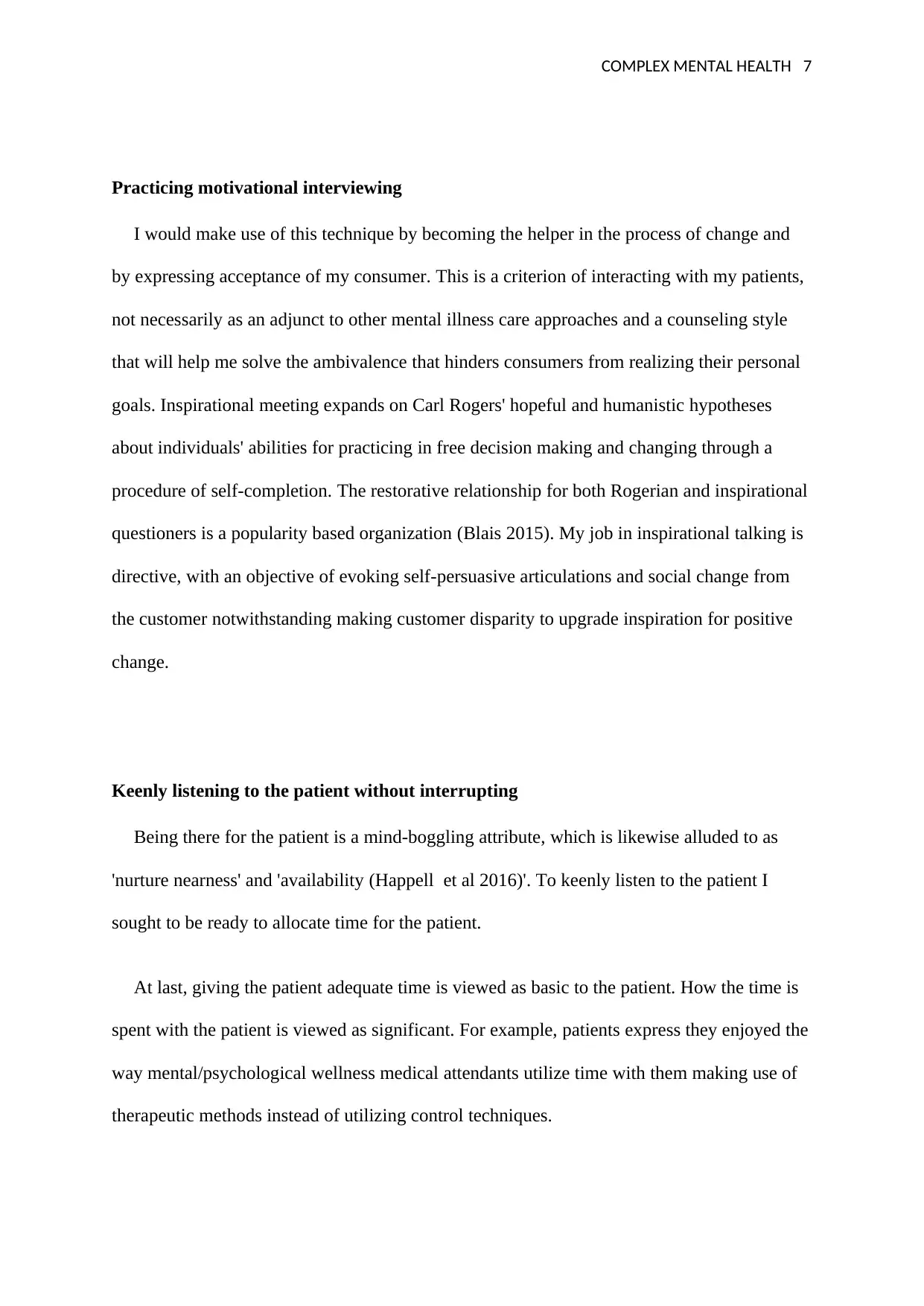
COMPLEX MENTAL HEALTH 7
Practicing motivational interviewing
I would make use of this technique by becoming the helper in the process of change and
by expressing acceptance of my consumer. This is a criterion of interacting with my patients,
not necessarily as an adjunct to other mental illness care approaches and a counseling style
that will help me solve the ambivalence that hinders consumers from realizing their personal
goals. Inspirational meeting expands on Carl Rogers' hopeful and humanistic hypotheses
about individuals' abilities for practicing in free decision making and changing through a
procedure of self-completion. The restorative relationship for both Rogerian and inspirational
questioners is a popularity based organization (Blais 2015). My job in inspirational talking is
directive, with an objective of evoking self-persuasive articulations and social change from
the customer notwithstanding making customer disparity to upgrade inspiration for positive
change.
Keenly listening to the patient without interrupting
Being there for the patient is a mind-boggling attribute, which is likewise alluded to as
'nurture nearness' and 'availability (Happell et al 2016)'. To keenly listen to the patient I
sought to be ready to allocate time for the patient.
At last, giving the patient adequate time is viewed as basic to the patient. How the time is
spent with the patient is viewed as significant. For example, patients express they enjoyed the
way mental/psychological wellness medical attendants utilize time with them making use of
therapeutic methods instead of utilizing control techniques.
Practicing motivational interviewing
I would make use of this technique by becoming the helper in the process of change and
by expressing acceptance of my consumer. This is a criterion of interacting with my patients,
not necessarily as an adjunct to other mental illness care approaches and a counseling style
that will help me solve the ambivalence that hinders consumers from realizing their personal
goals. Inspirational meeting expands on Carl Rogers' hopeful and humanistic hypotheses
about individuals' abilities for practicing in free decision making and changing through a
procedure of self-completion. The restorative relationship for both Rogerian and inspirational
questioners is a popularity based organization (Blais 2015). My job in inspirational talking is
directive, with an objective of evoking self-persuasive articulations and social change from
the customer notwithstanding making customer disparity to upgrade inspiration for positive
change.
Keenly listening to the patient without interrupting
Being there for the patient is a mind-boggling attribute, which is likewise alluded to as
'nurture nearness' and 'availability (Happell et al 2016)'. To keenly listen to the patient I
sought to be ready to allocate time for the patient.
At last, giving the patient adequate time is viewed as basic to the patient. How the time is
spent with the patient is viewed as significant. For example, patients express they enjoyed the
way mental/psychological wellness medical attendants utilize time with them making use of
therapeutic methods instead of utilizing control techniques.
Paraphrase This Document
Need a fresh take? Get an instant paraphrase of this document with our AI Paraphraser
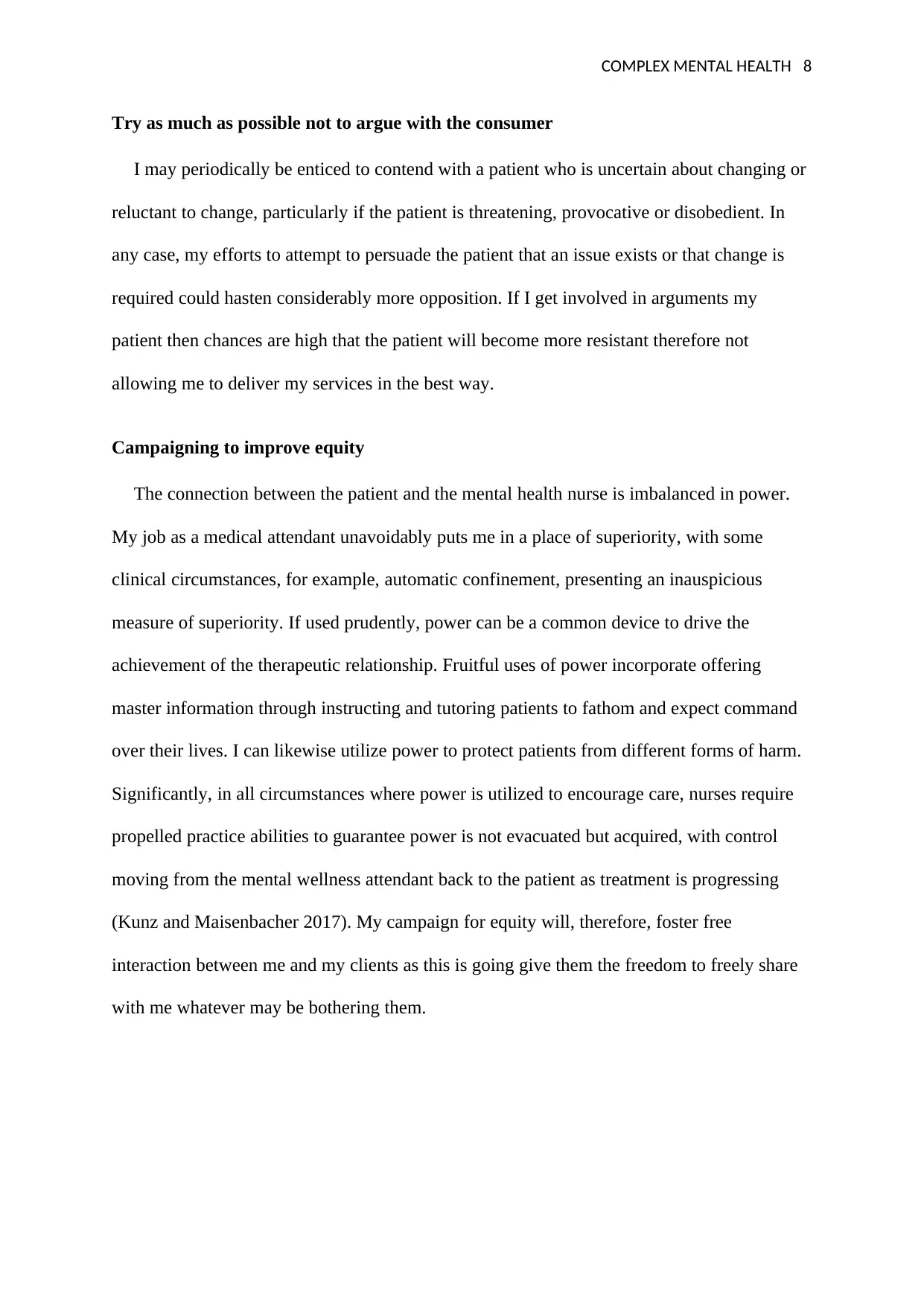
COMPLEX MENTAL HEALTH 8
Try as much as possible not to argue with the consumer
I may periodically be enticed to contend with a patient who is uncertain about changing or
reluctant to change, particularly if the patient is threatening, provocative or disobedient. In
any case, my efforts to attempt to persuade the patient that an issue exists or that change is
required could hasten considerably more opposition. If I get involved in arguments my
patient then chances are high that the patient will become more resistant therefore not
allowing me to deliver my services in the best way.
Campaigning to improve equity
The connection between the patient and the mental health nurse is imbalanced in power.
My job as a medical attendant unavoidably puts me in a place of superiority, with some
clinical circumstances, for example, automatic confinement, presenting an inauspicious
measure of superiority. If used prudently, power can be a common device to drive the
achievement of the therapeutic relationship. Fruitful uses of power incorporate offering
master information through instructing and tutoring patients to fathom and expect command
over their lives. I can likewise utilize power to protect patients from different forms of harm.
Significantly, in all circumstances where power is utilized to encourage care, nurses require
propelled practice abilities to guarantee power is not evacuated but acquired, with control
moving from the mental wellness attendant back to the patient as treatment is progressing
(Kunz and Maisenbacher 2017). My campaign for equity will, therefore, foster free
interaction between me and my clients as this is going give them the freedom to freely share
with me whatever may be bothering them.
Try as much as possible not to argue with the consumer
I may periodically be enticed to contend with a patient who is uncertain about changing or
reluctant to change, particularly if the patient is threatening, provocative or disobedient. In
any case, my efforts to attempt to persuade the patient that an issue exists or that change is
required could hasten considerably more opposition. If I get involved in arguments my
patient then chances are high that the patient will become more resistant therefore not
allowing me to deliver my services in the best way.
Campaigning to improve equity
The connection between the patient and the mental health nurse is imbalanced in power.
My job as a medical attendant unavoidably puts me in a place of superiority, with some
clinical circumstances, for example, automatic confinement, presenting an inauspicious
measure of superiority. If used prudently, power can be a common device to drive the
achievement of the therapeutic relationship. Fruitful uses of power incorporate offering
master information through instructing and tutoring patients to fathom and expect command
over their lives. I can likewise utilize power to protect patients from different forms of harm.
Significantly, in all circumstances where power is utilized to encourage care, nurses require
propelled practice abilities to guarantee power is not evacuated but acquired, with control
moving from the mental wellness attendant back to the patient as treatment is progressing
(Kunz and Maisenbacher 2017). My campaign for equity will, therefore, foster free
interaction between me and my clients as this is going give them the freedom to freely share
with me whatever may be bothering them.
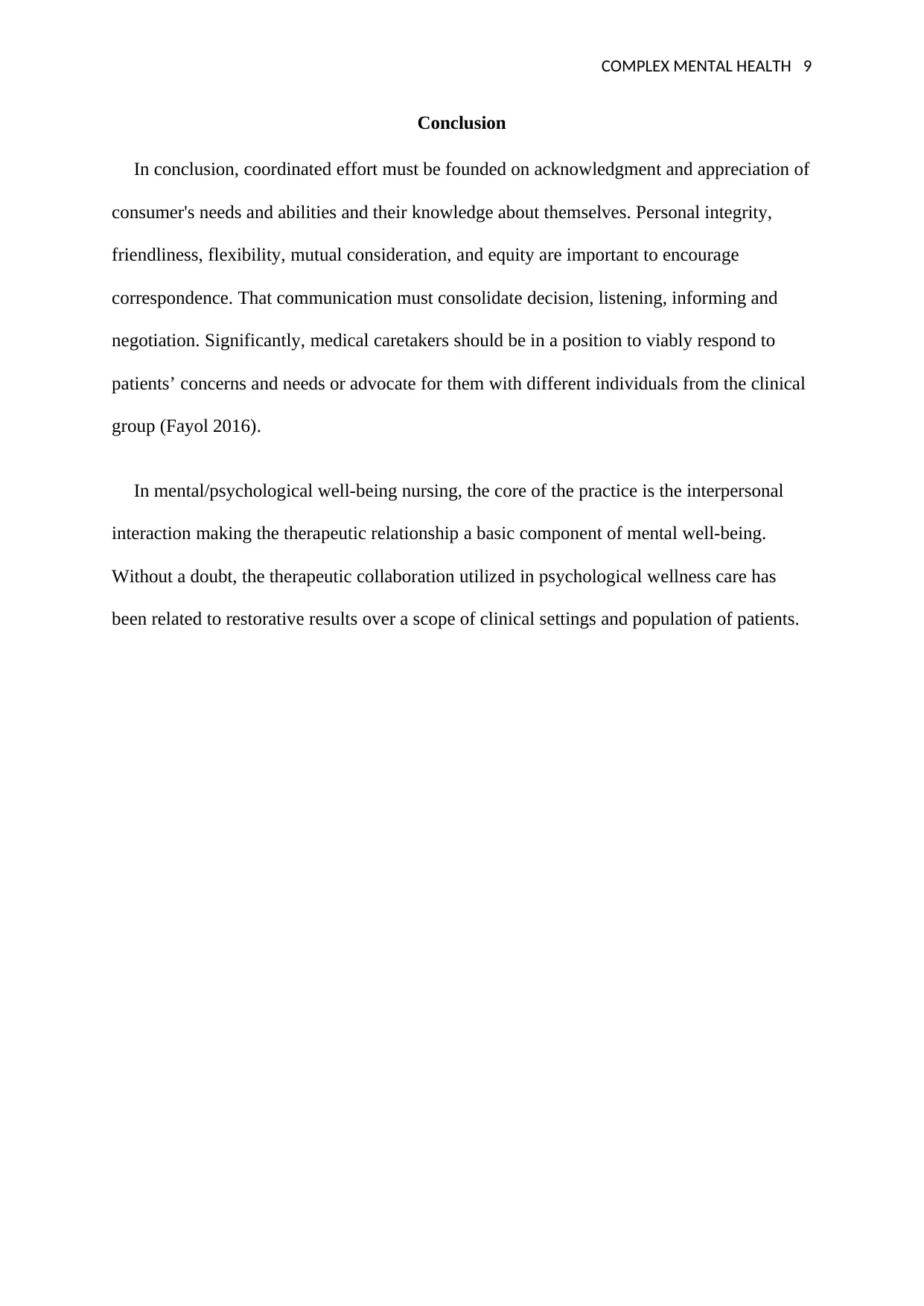
COMPLEX MENTAL HEALTH 9
Conclusion
In conclusion, coordinated effort must be founded on acknowledgment and appreciation of
consumer's needs and abilities and their knowledge about themselves. Personal integrity,
friendliness, flexibility, mutual consideration, and equity are important to encourage
correspondence. That communication must consolidate decision, listening, informing and
negotiation. Significantly, medical caretakers should be in a position to viably respond to
patients’ concerns and needs or advocate for them with different individuals from the clinical
group (Fayol 2016).
In mental/psychological well-being nursing, the core of the practice is the interpersonal
interaction making the therapeutic relationship a basic component of mental well-being.
Without a doubt, the therapeutic collaboration utilized in psychological wellness care has
been related to restorative results over a scope of clinical settings and population of patients.
Conclusion
In conclusion, coordinated effort must be founded on acknowledgment and appreciation of
consumer's needs and abilities and their knowledge about themselves. Personal integrity,
friendliness, flexibility, mutual consideration, and equity are important to encourage
correspondence. That communication must consolidate decision, listening, informing and
negotiation. Significantly, medical caretakers should be in a position to viably respond to
patients’ concerns and needs or advocate for them with different individuals from the clinical
group (Fayol 2016).
In mental/psychological well-being nursing, the core of the practice is the interpersonal
interaction making the therapeutic relationship a basic component of mental well-being.
Without a doubt, the therapeutic collaboration utilized in psychological wellness care has
been related to restorative results over a scope of clinical settings and population of patients.
⊘ This is a preview!⊘
Do you want full access?
Subscribe today to unlock all pages.

Trusted by 1+ million students worldwide
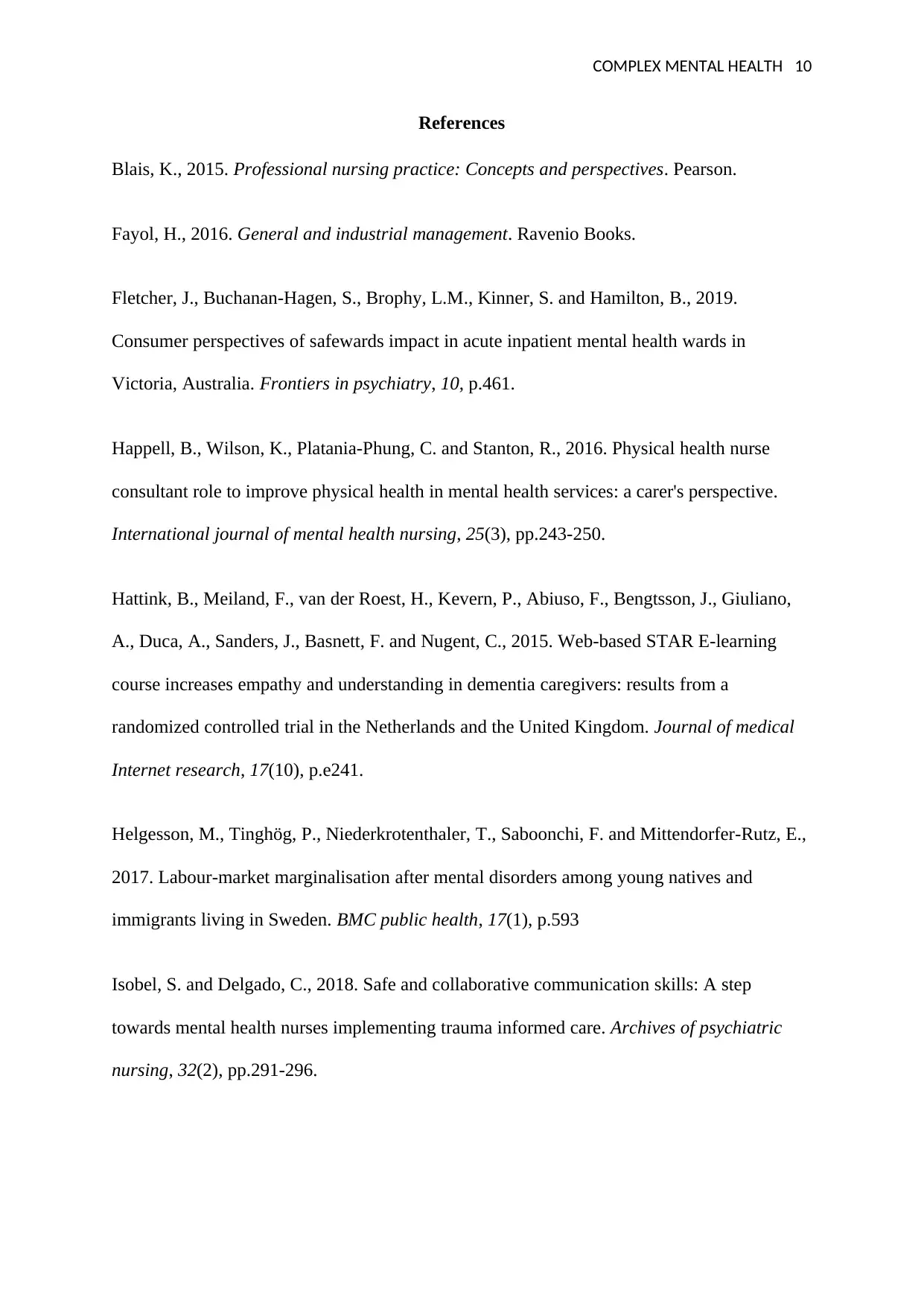
COMPLEX MENTAL HEALTH 10
References
Blais, K., 2015. Professional nursing practice: Concepts and perspectives. Pearson.
Fayol, H., 2016. General and industrial management. Ravenio Books.
Fletcher, J., Buchanan-Hagen, S., Brophy, L.M., Kinner, S. and Hamilton, B., 2019.
Consumer perspectives of safewards impact in acute inpatient mental health wards in
Victoria, Australia. Frontiers in psychiatry, 10, p.461.
Happell, B., Wilson, K., Platania‐Phung, C. and Stanton, R., 2016. Physical health nurse
consultant role to improve physical health in mental health services: a carer's perspective.
International journal of mental health nursing, 25(3), pp.243-250.
Hattink, B., Meiland, F., van der Roest, H., Kevern, P., Abiuso, F., Bengtsson, J., Giuliano,
A., Duca, A., Sanders, J., Basnett, F. and Nugent, C., 2015. Web-based STAR E-learning
course increases empathy and understanding in dementia caregivers: results from a
randomized controlled trial in the Netherlands and the United Kingdom. Journal of medical
Internet research, 17(10), p.e241.
Helgesson, M., Tinghög, P., Niederkrotenthaler, T., Saboonchi, F. and Mittendorfer-Rutz, E.,
2017. Labour-market marginalisation after mental disorders among young natives and
immigrants living in Sweden. BMC public health, 17(1), p.593
Isobel, S. and Delgado, C., 2018. Safe and collaborative communication skills: A step
towards mental health nurses implementing trauma informed care. Archives of psychiatric
nursing, 32(2), pp.291-296.
References
Blais, K., 2015. Professional nursing practice: Concepts and perspectives. Pearson.
Fayol, H., 2016. General and industrial management. Ravenio Books.
Fletcher, J., Buchanan-Hagen, S., Brophy, L.M., Kinner, S. and Hamilton, B., 2019.
Consumer perspectives of safewards impact in acute inpatient mental health wards in
Victoria, Australia. Frontiers in psychiatry, 10, p.461.
Happell, B., Wilson, K., Platania‐Phung, C. and Stanton, R., 2016. Physical health nurse
consultant role to improve physical health in mental health services: a carer's perspective.
International journal of mental health nursing, 25(3), pp.243-250.
Hattink, B., Meiland, F., van der Roest, H., Kevern, P., Abiuso, F., Bengtsson, J., Giuliano,
A., Duca, A., Sanders, J., Basnett, F. and Nugent, C., 2015. Web-based STAR E-learning
course increases empathy and understanding in dementia caregivers: results from a
randomized controlled trial in the Netherlands and the United Kingdom. Journal of medical
Internet research, 17(10), p.e241.
Helgesson, M., Tinghög, P., Niederkrotenthaler, T., Saboonchi, F. and Mittendorfer-Rutz, E.,
2017. Labour-market marginalisation after mental disorders among young natives and
immigrants living in Sweden. BMC public health, 17(1), p.593
Isobel, S. and Delgado, C., 2018. Safe and collaborative communication skills: A step
towards mental health nurses implementing trauma informed care. Archives of psychiatric
nursing, 32(2), pp.291-296.
Paraphrase This Document
Need a fresh take? Get an instant paraphrase of this document with our AI Paraphraser
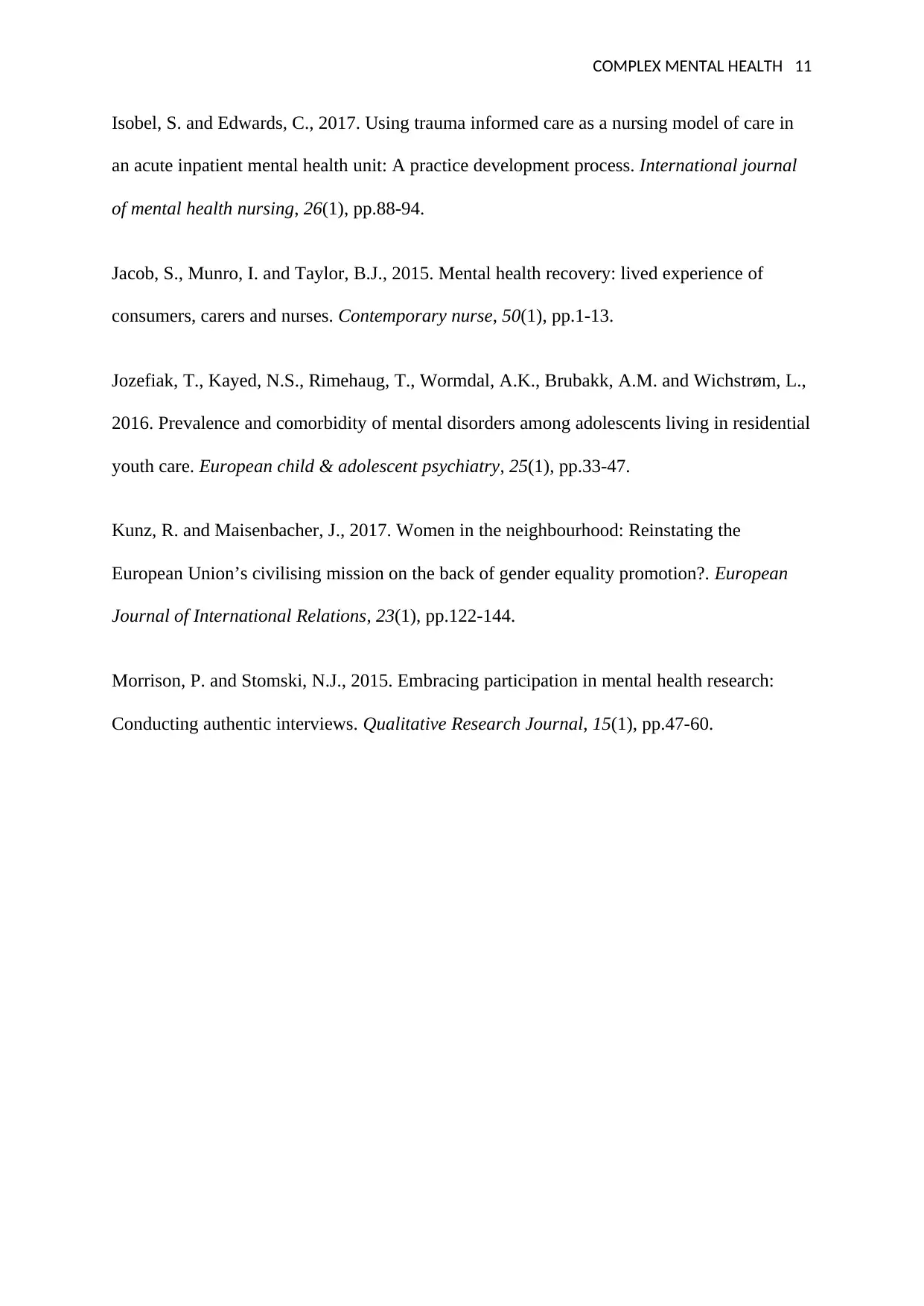
COMPLEX MENTAL HEALTH 11
Isobel, S. and Edwards, C., 2017. Using trauma informed care as a nursing model of care in
an acute inpatient mental health unit: A practice development process. International journal
of mental health nursing, 26(1), pp.88-94.
Jacob, S., Munro, I. and Taylor, B.J., 2015. Mental health recovery: lived experience of
consumers, carers and nurses. Contemporary nurse, 50(1), pp.1-13.
Jozefiak, T., Kayed, N.S., Rimehaug, T., Wormdal, A.K., Brubakk, A.M. and Wichstrøm, L.,
2016. Prevalence and comorbidity of mental disorders among adolescents living in residential
youth care. European child & adolescent psychiatry, 25(1), pp.33-47.
Kunz, R. and Maisenbacher, J., 2017. Women in the neighbourhood: Reinstating the
European Union’s civilising mission on the back of gender equality promotion?. European
Journal of International Relations, 23(1), pp.122-144.
Morrison, P. and Stomski, N.J., 2015. Embracing participation in mental health research:
Conducting authentic interviews. Qualitative Research Journal, 15(1), pp.47-60.
Isobel, S. and Edwards, C., 2017. Using trauma informed care as a nursing model of care in
an acute inpatient mental health unit: A practice development process. International journal
of mental health nursing, 26(1), pp.88-94.
Jacob, S., Munro, I. and Taylor, B.J., 2015. Mental health recovery: lived experience of
consumers, carers and nurses. Contemporary nurse, 50(1), pp.1-13.
Jozefiak, T., Kayed, N.S., Rimehaug, T., Wormdal, A.K., Brubakk, A.M. and Wichstrøm, L.,
2016. Prevalence and comorbidity of mental disorders among adolescents living in residential
youth care. European child & adolescent psychiatry, 25(1), pp.33-47.
Kunz, R. and Maisenbacher, J., 2017. Women in the neighbourhood: Reinstating the
European Union’s civilising mission on the back of gender equality promotion?. European
Journal of International Relations, 23(1), pp.122-144.
Morrison, P. and Stomski, N.J., 2015. Embracing participation in mental health research:
Conducting authentic interviews. Qualitative Research Journal, 15(1), pp.47-60.
1 out of 11
Related Documents
Your All-in-One AI-Powered Toolkit for Academic Success.
+13062052269
info@desklib.com
Available 24*7 on WhatsApp / Email
![[object Object]](/_next/static/media/star-bottom.7253800d.svg)
Unlock your academic potential
Copyright © 2020–2026 A2Z Services. All Rights Reserved. Developed and managed by ZUCOL.





